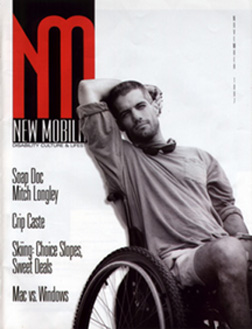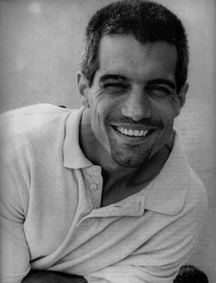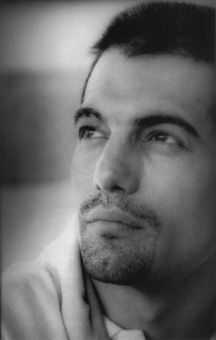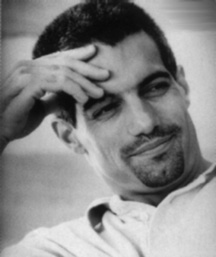Mitch Longley:
Changing the Script, Keeping His Cool
From: New Mobility Magazine, November 1997
Story by: Sam Maddox
 Matt Harmon, the character played by Mitch Longley on ABC TV's Port Charles,
isn't your average soap opera paraplegic. His daytime disability won't be miraculously
cured a week from Tuesday. Matt Harmon, the character played by Mitch Longley on ABC TV's Port Charles,
isn't your average soap opera paraplegic. His daytime disability won't be miraculously
cured a week from Tuesday.
His knobby-tread wheelchair doesn't symbolize anger or wickedness, and it isn't used to
milk pity or admiration. Harmon, like the actor himself, is wholesome, capable, spirited
and sensual. "The disability," says Mitch, "is just not that big of a
deal."
Longley, whose 14 years of paralysis add truth to his performance, is an original cast
member of Port Charles, a spinoff from the daytime hit General Hospital. The character he
plays is one of seven fabulous-looking young interns who've begun residency at the
hospital. They share the usual professional pressures and heroic expectations of the
medical setting. They all have hidden pasts and are routinely exposed to familiar daytime
stereotypes: The script is peopled by dreamers, schemers, suck-ups, stuck-ups, brooders,
breeders and bottom-feeders. The show runs on ambition, libido and contested paternity,
fueled by treachery, lechery and a fair bit of far-fetchery.
After three months, Matt Harmon's been set up as Port Chuck's resident choirboy, the team
player whose moral ballast offsets the unrestrained ambition surrounding him. He is calm
and pretty cool--until anyone begins to feel sorry for him or insinuate that he isn't up
to the task of being a doctor.
"He's a little bit more defensive than I am or ever was," says Longley of his  character.
"But I think Matt feels like he's got more to prove. It's not like I don't have
something to prove to my industry as an actor--I do--but Matt's a little hyper, kind of
aggressive. I've always been pretty mellow and laid back." character.
"But I think Matt feels like he's got more to prove. It's not like I don't have
something to prove to my industry as an actor--I do--but Matt's a little hyper, kind of
aggressive. I've always been pretty mellow and laid back."
To be sure, Mitch Longley, 32, is the portrait of informality. He arrives for lunch in his
"spiritualmobile," a 1983 Buick given to him new at the time of his injury by
hometown friends back in Rowayton, Conn. Mitch is dressed in his everyday uniform--shorts,
tank top, shades and sandals. His dark hair is salted with gray and cropped short.
We meet at a quirky Venice, Calif., restaurant called Van Go's Ear, where Patti Shanaberg,
Mitch's publicist, joins us. She has prepared a file of print and video clips covering her
client's career. Patti, who has lived with a couple of decades of spinal cord injury
herself, has this take on the story: "One would be hard-pressed to find anyone with a
disability who has made a more powerfully positive impact on public perception of
disability than Mitch Longley.
Maybe so. But we're not planning to press too hard on any lofty sociology today. We're
talking about a job on a soap opera.
Mitch is warm, relaxed and completely unselfconscious. He's got a big, easy laugh. His
occupation is a good match to his temperament: full-time pay, lots of free time. Because
the half-hour show has so many characters with story lines, cast members often get days
off. "Today I didn't work," Mitch says. "There was a sweet breeze blowing
through my house. The sun was shining. I'm thinking, like, what show? Don't get me wrong.
I'm very grateful to have the job, to be working. But I have four or five very
close-to-my-heart projects I'm committed to."
 One of those projects is his body. Mitch swims, practices yoga and rides an
FES bike over at the VA every few days. He looks like he pumps a little iron, but no, he
says, that's a natural upper body buff. He likes to plink around on a guitar, take
photographs of his friends. He also runs a little nonprofit organization called Sowoho,
short for Spirit of the Wounded Horse, which funnels resources to needy Native Americans
with disabilities. One of those projects is his body. Mitch swims, practices yoga and rides an
FES bike over at the VA every few days. He looks like he pumps a little iron, but no, he
says, that's a natural upper body buff. He likes to plink around on a guitar, take
photographs of his friends. He also runs a little nonprofit organization called Sowoho,
short for Spirit of the Wounded Horse, which funnels resources to needy Native Americans
with disabilities.
According to the clips, Mitch is a vegetarian who doesn't own a TV. Well, he won't eat
meat, but he does have a tube. He just doesn't watch soap operas.
On Port Charles, Matt's disability is handled true to life. Mitch says his input keeps it
from being too sentimental. "The writers want to bring reality to the notion of
spinal cord injury, and they certainly incorporated a lot of my experience and knowledge
into the character. When the dialog isn't appropriate, I'm comfortable suggesting a
change.
"For example, my character is talking to a little girl in the emergency room after
she hurt her ankle, and she asked me why I was in a chair, as she was. The script said,
'Why walk when you can roll?' I'm trying to make a joke of it, see? But I would never turn
the truth away from a child who is curious enough to ask, so I talked to the producers
about rewording the scene. You just say, 'When I was young, I had an accident, too, and
it's taking me longer to get better. I guess we're both pretty lucky, right?' That's a
much more honest, clear, focused, unafraid response, instead of trying to pull off some
bullshit that you're happy with your accident.
"Another time, when Matt was beefing with his boss, the script said, 'The only real
authority I answer to is this chair.' First of all, I just didn't get it. What do you
mean, my chair's an authority? Is your chair an authority? Uh-uh, I changed it to 'the
real authority is my own conscience.'"
ABC's public relations material indicates that Matt thinks he may walk again. Does walking
figure into Mitch's personal script? "I use braces and crutches. I've done FES
walking, too, and I may get a Parastep system [FES with a walker], but that's not what I'm
waiting for." Hold on, scriptwriters, there may be a miracle cure in here somewhere.
Says Mitch: "I believe there's some incredible [medical] stuff that may occur in my
lifetime."
Mitch, who was rated "most friendly" in high school, was injured in 1983, two
weeks before graduation. He wrecked his car after falling asleep at the wheel a few blocks
from home.
He first made a name for himself in 1991. He modeled for Ralph Lauren, his long black mane
over the shoulder of a pinstriped power suit. It was a lucky break that led directly to a
gig in 40 episodes of the NBC soap Another World. The producers wanted him back for
another season; he said no thanks.
Mitch was on the edge of success, but he saw it as more like a precipice. He didn't move
to New York, didn't do interviews, just hung out in the suburbs playing Yahtzee. "I
couldn't handle it, it all came down so fast. I needed to grow up some."
Then 27, he dropped out of circulation for a few years. He traveled, kicked back. He
visited Mexico and the U.S. West, later hooking up with a friend in Colorado who was
considerably younger. "That friendship was a gift; my buddy was my age when I got
hurt and I sort of got in touch with that stolen era in my life. We hung out in the
desert, lived under the stars." When his younger pals began to grow up faster than he
wanted to, Mitch realized that the road trip was over.
Mitch says he'd wanted to be an actor since he was 5 years old, and acting was something
to fall back on. Early inspiration? "As a little kid, I was the biggest Charlton
Heston fan on the planet. The whole Planet of the Apes thing, forget it. I wanted to be
that little jungle boy that Charlton threw over his shoulder and saved from that killer
General Ursis."
When he finally decided to take the craft seriously, he studied in Manhattan with Elaine
Aiken. She taught him a most important lesson: The emotional life controls the physical
life. "I used to do awkward things with my body and I wasn't comfortable performing
or acting. But once you settle into the emotions and how they affect the motivation of a
scene or of the character, the body responds." These days, he says, the creative
energy of acting is emotionally cathartic.
Older and bolder now, Mitch eventually made the move to the West Coast, landing in Santa
Monica. The low-key coastal town suits his unhurried, be-here-now lifestyle. He got a few
commercial jobs and a few parts on network series, including The Burning Zone and
Vanishing Son. Casting calls for gimp actors are few and far between, but he
wasn't out of work for long.
In 1995, Mitch wrote a one-man play, Courting Darkness. It's a coming-of-age biography,
"a search for emotional honesty." Mitch plays 20 different characters, from the
recovery room surgeon to his adaptive driving teacher to the Hollywood executive who's
clueless about disability. "I knew I had to write something definitive of who I
am," he says. "What is my reality about? This was a way to look honestly at the
pain and anger of my getting hurt."
It was also a way to get his name in front of the industry. He produced the play in
Hollywood earlier this year. Shortly after that, he got the call to read for a major part
in a new daytime show.
Port Charles co-creator and executive producer Wendy Riche came up with the role of a
disabled intern for its dramatic potential. "I didn't know too much about the
disability aspect itself. I figured we'd learn that as we went," Riche says.
 Landing the job on Port Charles is a major career move for Longley. He
"stole" the part from 30 other wheelchair-users trying out for it, says Riche.
"He was everything I was looking for. It was his humanity, his humor, his
determination, his reality, his lack of self-pity." Landing the job on Port Charles is a major career move for Longley. He
"stole" the part from 30 other wheelchair-users trying out for it, says Riche.
"He was everything I was looking for. It was his humanity, his humor, his
determination, his reality, his lack of self-pity."
"In certain ways, this is a big break," says Longley. "In other ways, it's
a continuation of momentum I had over the last few years. It definitely signifies more of
a professional commitment on my part, in terms of signing the contract, showing up for
work prepared, being professional. I needed to move into that level--instead of running
away in my spiritualmobile, which I'm really good at doing.
"Besides, I'm not getting any younger, I'm out of my 20s now. I'd like to create some
kind of base."
The following day, Mitch has three scenes to tape at ABC's studios in North Hollywood. The
sound stage is in fact a big warehouse full of lights, cameras and cables, with a handful
of sets. Each scene lasts only a minute or two, but the preparation and rehearsal can be
tedious. In the script, Matt is helping his boss, the uptight and unforgiving chief
resident, Ellen Burgess (played by Debbi Morgan). She has a malpractice suit gnawing at
her, but Matt's convinced she can beat it. Later, after Matt discovers evidence that
exonerates Ellen (ohmygod, Greg Cooper faked his own seizure!), she braces herself for a
major I-told-you-so. He's too sweet for that and, instead, tells her that her face is
pretty when she's happy, which catches her off-guard and exposes her vulnerable side.
After three takes start to finish, they need another. Mitch, comfortable and very much
himself, asks director Jill Ackles, "Do you want my tongue in or out?"
Matt is the only intern who won't back down from Ellen. They share a lot of scenes, and
hints are sprinkled every few days indicating the two may soon steam things up
romantically. So far, Matt's been relegated to subplot status.
The fans want more. "He deserves a juicy story and so do we," says Starwalker on
the Port Charles Web site message board (portcharles.com). According to the mavens at Soap
Opera Digest, Matt Harmon is one of the top ten most underutilized characters in all of
daytime TV-land. "Give Matt his own story line," the magazine says. "Mitch
Longley is too talented to be wasted and too sexy not to have a love interest."
Longley, who signed a three-year contract with Port Charles, doesn't mind the slow
unfolding. "They're taking their own sweet time developing my character, which I
actually like. The pace is building and I think the audience is really intrigued and
interested in what's happening. We have more than two years left to do something really
intense, and I'm sure the writers will take advantage of it."
According to Wendy Riche, Matt Harmon will evolve into a big-time role with a story line.
After just three months, the original head writer was replaced by Lynn Latham, formerly a
writer and producer for Knot's Landing. Riche wouldn't comment on the shake-up. Perhaps
ABC wasn't happy with its nearly last-place showing in the daytime ratings. Whatever, the
change looks good for the sit-down intern.
"It's just the beginning for Mitch," says Riche. "Lynn has some good ideas
for his character. The audience response has been tremendous. They love him."
Yes they do. Fans have set up a separate Matt Harmon Web site
(members.aol.com/patr33roy/longley/html). One set of fans calls itself Matt's Guardian
Angels--Alice is "keeper of those beautiful eyes." Traci is "guardian of
Matt's soul and destiny." Amy keeps the wheelchair, Elaine keeps the haircut.
Patti Shanaberg, keeper of the clips, may be fan No.1. "Mitch is too young to be an
old hippie," she says, "too intelligently pragmatic to be a new age flower
child. But one look into his dark eyes reveals the heightened awareness of a very old
soul. Could this altruistic throwback to the '60s also be the thinking woman's 'sexiest
man alive?'"
If so, Mitch isn't buying it. He has a stack of fan mail in his dressing room that sits
unread. He doesn't read any of the online stuff. "It's stressful to me," he
says. "Part of me tends to push away anyone with an inclination to get to know me.
What I offer them is what I offer in my work. I don't want to be put on a pedestal. I hate
people kissing my ass more than I hate kissing ass, and I hate kissing ass more than
anything on the planet."
Mitch says his perspective has been profoundly affected by his travels, especially to
developing countries. It's like this, says Mitch: There are places "where the heart
dictates action, a place where people are nourished by the world and treated with dignity
and respect." I don't think he's talking about Los Angeles.
There are "secrets of the universe to be learned from people who have nothing. I've
lived with them and it's dirty and smelly, but very rich. I dig it. It's very humbling and
it balances out the enormity of wealth and fame I'm exposed to."
He hopes fans and the media respect his privacy and individuality. He also knows the
street runs two ways. "The media and publicity machine, at this stage, I kind of
ignore it. I don't mean to come off as arrogant, but there are other things in my life
that are so much more interesting. So now I am lucky enough to be an original cast member
of a brand-new television show. That's a huge opportunity. Plus, it got this wonderful
media blitzkrieg, which I may never experience again as an actor."
Fans recognize him on the Santa Monica 3rd Street Promenade. His face has been on huge
billboards in New York City, on the sides of buses in L.A. "It's the experience of
seeing yourself out there in places you did not expect to see yourself and learning that
that's part of the business and it's OK," he says. "And that doesn't come
naturally to me because I am a private person. As much as I can, I want some sense of
control over my image. In this situation, I felt totally comfortable with it all, because
it's not my image. It's the character's image that they are perpetuating. I didn't feel
like it was me on the bus or me on the building. It was Dr. Harmon."
Public life is a bittersweet pill. It's how Mitch has chosen to make a living, with a
string or two attached. "I don't want to play the fame game. I don't want people I
don't know taking my picture, having me take my shirt off and trying to make my nipples
hard so I can be their idea of a sex symbol. Because then people I meet would react to me
as that, as a sex symbol. What it comes down to is I don't want to change."
Back to Articles
|